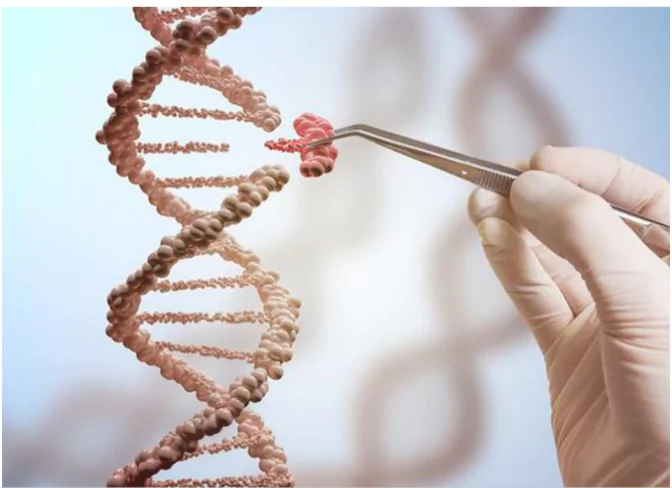According to the International Agency for Research on Cancer, 1 in 5 people will likely develop cancer in their lifetime.
Rising Global Cancer Burden: Inherited Risk and Future Projections
- In 2022, there were 20 million new cancer cases and nearly 10 million deaths due to cancer. By 2045, this is expected to increase to 32 million cases and 16 million deaths.
- Asia is predicted to have almost half of the world’s cancer cases by 2045.
- Inherited Cancer Risk:
- About 10% of cancers are caused by genetic mutations passed down from parents.
- These inherited mutations are more common in ovarian cancer (20%) and occur in about 10% of people with breast, colorectal, lung, and prostate cancers.
Enroll now for UPSC Online Course
Genome Editing

- Genome editing refers to technologies that allow scientists to change an organism’s DNA.
- This involves adding, removing, or altering genetic material at specific points in the genome.
- CRISPR-Cas9 Technology
- CRISPR-Cas9 is a popular genome editing tool because it is faster, cheaper, more accurate, and more efficient than other methods.
- It was adapted from a natural defence mechanism used by bacteria to fight viruses.
- How does CRISPR-Cas9 Works?
- Bacteria store viral DNA segments in their genome, forming CRISPR arrays.
- These arrays help them recognize and cut the DNA of attacking viruses using the Cas9 enzyme.
- Scientists have adapted this process to target and edit specific DNA sequences in human cells using guide RNA and the Cas9 enzyme.
- Applications in Disease Treatment
-
- Genome editing is helpful to treat diseases like cystic fibrosis, haemophilia, and sickle cell disease.
- It also holds promise for more complex conditions, such as cancer, heart disease, and HIV.
Somatic vs. Germline Editing
- Somatic Cells: Changes made to non-reproductive cells are not passed onto offspring.
- Germline Cells: Editing of egg or sperm cells can result in inherited changes.
|
Ethical Concerns
- Most genome editing affects somatic cells (non-reproductive cells), meaning changes aren’t passed to future generations.
- Editing germline cells (egg or sperm) raises ethical concerns since these changes could be inherited.
- Currently, germline editing is illegal in many countries due to safety and ethical issues, especially regarding enhancing human traits like intelligence or height.
Check Out UPSC NCERT Textbooks From PW Store
About Hereditary Cancer Syndromes
- Hereditary cancer syndromes are genetic disorders where mutations in one or more inherited genes increase the risk of developing cancer.
- These mutations can also cause cancer to develop at an earlier age.
- Key Features
- Individuals with hereditary cancer syndromes have a higher lifetime risk of cancer.
- They may also develop multiple independent cancers in their lifetime.
- Causes
- Most of these syndromes are caused by mutations in tumor suppressor genes, which normally protect cells from becoming cancerous.
- Other affected genes include those responsible for DNA repair, oncogenes (genes that promote cancer growth), and angiogenesis (the formation of blood vessels).
- Common Syndromes
- Examples include Hereditary Breast-Ovarian Cancer Syndrome and Lynch Syndrome (Hereditary Non-Polyposis Colon Cancer).
BRCA Genes
- The BRCA1 and BRCA2 genes, discovered in the mid-1990s.
- These are important for understanding hereditary cancer, particularly breast and ovarian cancers.
- BRCA and Cancer Risks
- Mutations in the BRCA1 and BRCA2 genes increase the risk of breast, ovarian, and fallopian tube cancers in women, as well as prostate and breast cancer in men.
- These mutations are also linked to a higher risk of cancers like pancreatic, colorectal, and uterine cancers.
- Prevalence of BRCA Mutations
- BRCA mutations occur in about 1 in 400 people.
- However, certain groups, like Ashkenazi Jews, have a much higher prevalence of 1 in 40 individuals.
Enroll now for UPSC Online Classes
Importance of Genetic Testing and Treatment
- Genetic Testing for BRCA Mutations
- Testing for BRCA mutations is important as it helps identify people at higher risk for cancer.
- This allows for personalised prevention strategies, such as regular screening or preventive surgeries.
- Targeted Therapies for BRCA Mutations
- Treatments like PARP inhibitors have shown promise in treating cancers caused by BRCA mutations.
![]() 9 Oct 2024
9 Oct 2024
